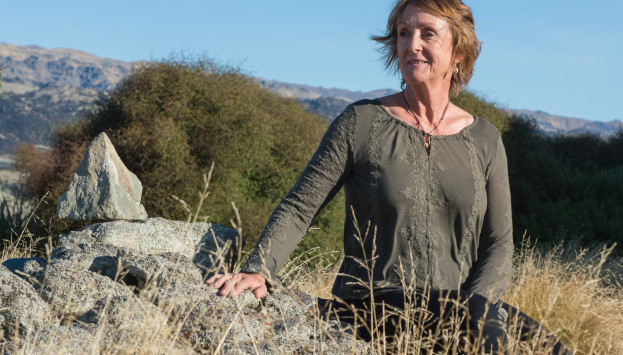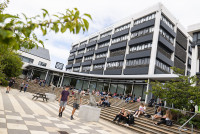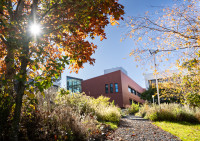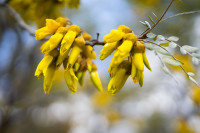After almost 33 years at Otago Polytechnic’s Central Campus, Jo Wakelin is leaving for fresh challenges.
Certainly, she describes her future as a “renaissance rather than retirement”.
Well respected for her horticultural expertise and contribution to both education and industry, Jo says horticulture is in her DNA.
And she’s not speaking figuratively – one of her ancestors, the Reverend Richard Johnson, is regarded as the father of the Australian citrus industry.
“Really it is all about plants,” Jo says. “I get the most buzz out of plants, particularly alpine natives, vegetables, medicinal and dry-loving xerics.”
Yet, the passing of knowledge to others is also an obvious passion: Jo has taught horticulture to primary and secondary school students, at certificate and diploma level, online, face to face, in industry, to farmers . . . in fact, “anybody who wants to learn to grow”, she says.
“I do get a buzz from seeing graduates progressing in industry and the feeling that I may have helped contribute to their passion.”
Jo notes there have been plenty of highlights during her time at Otago Polytechnic, which she joined in 1990.
These include the rise in popularity of the annual Giant Plant Sale at Labour Weekends, the new nursery at Bannockburn Rd, along with other initiatives.
“The steady development of a commercial plant nursery at Cromwell has resulted in more than 25 Giant Plant Sales, with increasingly larger crowds lining up to catch a bargain grown by the students.
“And thanks to Philip Cullen for allowing the funds to develop the enviable new nursery complex at the Bannockburn Road campus – it is a wonderful facility!”
Jo has also been closely involved in massive redesign of horticulture programmes during the D4LS phase, and the development of the NZ Certificate in Horticulture (Level 3), an online programme that immediately attracted almost 800 applications.
Jo has recently developed a medicinal herb bed at the Central Campus in a partnership with Artemis, a producer of traditional plant medicines. More than 20 different species of medicinal herbs, from echinacea to ashwagandha, have been trialled.
Passionate about environmentally conscious landscaping, Jo has highlighted the sustainable use of water to her students and the local communities.
“After so many presentations to groups and conferences over the years, it is heartening to see increasing awareness of water use in landscaping.”
She played a key role in establishing the Water Conservation Garden in Cromwell. Starting as an initiative from Otago Polytechnic, it has been supported by the Cromwell Community Board and the Central Otago District Council, and aims to educate people about the sustainable use of water in local gardens.
Jo has fully supported and helped develop Project Gold, a Department of Conservation initiative encouraging Otago people to grow and look after their own kōwhai trees and strengthen enthusiasm for Central Otago’s dryland forest restoration.
Reflecting on more than three decades at Otago Polytechnic, Jo says she is particularly grateful to longstanding colleagues Alex Huffadine and Jo Brun at the Central Campus.
They have become much valued friends over 30-plus years of teaching and fun together.”
Says Alex: “I happened to know Jo before she came on board part-time back in the early 90s. Jo is a great teacher. Her attention to detail is incredible and students get this benefit.
“Her knowledge of our regional plants is second to none. Jo also had that unique skill of being able to apply theory into practice and students definitely benefited from this.
“While I was campus manager, I was lucky enough to be able to lean on Jo for support when I was really stretched. Jo could step into any role and had a great knowledge of academic process and quality.”
As for her next growth cycle, Jo has established a consultancy and will continue to develop a 4ha commercial cherry orchard at her home near Mt Pisa.
She is also planning to spend more time enhancing her resilient dry-loving garden, which is gaining international recognition, having featured in a number of books, as well as in the New York Times, the UK’s Sunday Telegraph and in several Australasian magazines.
“Most notably, it was one of 40 gardens worldwide to be included in Wild – The Naturalistic Garden by the British authority, Noel Kingsbury,” Jo says with no small measure of pride.
FOOTNOTE: The Reverend Richard Johnson arrived in Australia on 26 January 1788 with the First Fleet. While en route to Australia, he stayed at Rio de Janeiro. Thinking the oranges there might grow well in Botany Bay, he obtained seeds - which he later planted successfully - thus becoming the father of the Australian citrus industry.
PHOTO CREDIT: JULIET NICHOLAS
Published on 26 Oct 2022
Orderdate: 26 Oct 2022
Expiry: 26 Oct 2024






